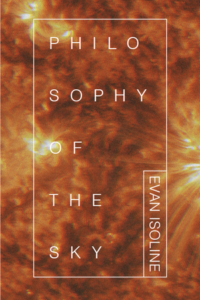
[11:11 Press; 2021]
Historically, within literature, philosophy, and psychology, the notion of self has been explored in terms of verbs — thinking, acting, and other spins such as shopping (courtesy Barbara Kruger’s 1987 critique of consumerism). Then there are other ways of defining the self. One includes Freudian notions of layering of the ego, its entanglement with Eros and Thanatos. Another methodology of defining the self is vis-a-vis the Other, as, for instance, in the philosophy of Hegel who finds the Other intertwined within the act of defining the Self. A third can be taken from the poeticism of the self in that the “I”, and poetry’s relationship with it, is an eternal theme of literature. Arguably the most well-known example is Walt Whitman’s Song of Myself, but, really, there are countless examples
Evan Isoline’s volume of poetry, Philosophy of the Sky, could be understood as a philosophy of the self — as if to say I Sky, Therefore I Am (Self). The book makes a poetic impact on all such existing ways of defining the self and engaging with it. In Isoline’s craft, one sees Walt Whitman’s energy in the song of oneself (think his famous words “I celebrate myself, and sing myself”), albeit updated for twenty-first century conditions of wandering in and out of a self that is crowded, disrupted, and interrupted by multiple forces (for example, social media). Although Isoline does not explicitly claim any relationship with Whitman, the association stands out in various bits, pieces, and in lines throughout the book. There are many, but here is one:
I’m at the edge of the world and the world is what I am.
I press play on myself.
Cumulatively, such lines bring about a deja-vu: readers of poetry have experienced such deep meditation on the self and the world/nature around it: Whitman’s singing of himself, Tennyson’s Ulysses saying “I am become a name”, Emily Dickinson’s “I dwell in Possibility” and so on. An awareness of such similarities offers a great entry point into Isoline’s unusual book that brings together all kinds of literary matter: blank pages, different kinds of fonts, experiments in typography, inclusion of shapes, experiments with visual space (for example, the insertion of boxes, which make parts of the book look like a “student-friendly” textbook), and layouts that border on looking like diagrams. All of which makes Isoline’s unpaginated book a curiosity. It’s a wonderland in which readers might choose to take the Whitmanian pill to explore and, to some extent, it might even help. In Philosophy of the Sky, both the self and the sky are not clearly unitized entities. There are no landmarks, nothing to help one navigate the expanse. But Isoline’s visual and textual features add variety and lend an experimental interpretation to his expression of the self. Devoid of these elements, the book might look like a long document. However, these features compliment the poetry and, in some instances, are the poetry in themselves. Isoline’s unique way of blending the visual and the verbal binds the volume.
The book has nine parts, but they don’t necessarily stand out as distinct units that are thematically or stylistically separate from each other. Instead, they flow into one another and are expansive — one almost holds the other within itself. To understand Isoline’s musings on the self, one must approach them with two metaphors and entities that cannot, themselves, be understood in terms of smaller, reductionist units: the ocean and the sky.
The ocean, as an idea, is scattered throughout the work and, at each point, reveals something about the self and the body. The “speaker” or the self in the poem refers to intimacy with the ocean in different ways: “a sort of hallucinated sex”, “ocean as alive with its own new sex”:
The ocean is my desert.
A self-inflicted, objectifying, unalterable, subject-causing,
uncontrollable/causal object of desire.
The ocean and the self are one:
It is the ocean that is swimming in my mouth
the images will be there to satisfy my mind and my soul until there is nothing left.
And when the speaker urinates on themselves, “the warmth and the ammonia smell are irrevocably matched in my mind with a cinematic image of the ocean.” It is fascinating to see the self emerge in such intimacy, especially in the parallels that Isoline draws between self and nature, body and ocean.
Similarly, the sky is present in different spaces throughout the book, but it takes a little longer for the connection between this meditation on the self and the sky to be distinctly received — especially given the fact that “the sky” is promised in the title. But then, there it is, as freedom, and the connecting link between the two appears on page 66 — about one fourth into the book:
I want to be free for us
The word freedom
is in the sky
Isoline offers a theory, an image, a knowing: here, philosophy of the sky is the philosophy of the self because nothing else captures the idea of freedom that is required to understand both. Both are incorporeal, physically intangible, and yet both, the self and the sky, are everywhere. They are inescapable and all-consuming:
I am obsessed with looking at the sky. Wherever I am, I just walk around aimlessly and look at the sky. I love the sky. It scares and excites me. I never understood that by obsessing over something, I was bringing that thing closer to me . . . I like very much to think of the sky as an object. A singular form or ‘thing’, like the spherical objects it endomes. I am attracted to thinking of the sky as an object because it continuously, and automatically, falls outside of this classification.
To the shape of a shadow, the easily recognised silhouette that comes to mind when we think of self or body, Isoline brings a sense of disruption by suggesting the sky as a being. It is not a reductive, idyllic container of clouds or rain to be romanticised through poetry, but it is, for Isoline, something solid: something with a sense of agency that refuses to be defined or something that has a shape. These possibilities come alive in passages such as this one where Isoline offers some clarity of the book’s title:
I like to think of a relationship between the sky’s refusal to be defined and instinctual fears of physical annihilation and dismemberment.
The sky is often thought of as either flat or round. Flat as in a theatrical backdrop, and round as in a planetarium.
Both appeal to me in sexual and violent ways.
Sex and violence. In the book, the coming together of these two things is a union that informs many of the opposites and paradoxes that underline Isoline’s perspective of “myself” or my self. For example:
I will eat myself because I will starve
I will starve for the love of the thing that will kill me.
Or:
I think of a kind of sex that I couldn’t have
a suicidal form of masturbation
I’m sick of being with myself, the monster of me I have reproduced nothing but my own discontinuity (the reason why I want to be killed is because I do not want to be killed) If I kill him, I kill myself
I have hermaphroditically negated myself with a word I made a word into a gesture”
A sense of strange circularity looms over such lines. The act of starving to an extent that one eats oneself, or loving-nurturing that thing that ultimately reciprocates the care by killing the self, is a case in point. Such lines begin with a setting out of self but come back with the idea of unexpected violence. Self, in this sense, like the sky, is a space that lives between the starting and ending points of Eros and Thanatos — what is pleasure is also pain.
Indeed, in other words, as Isoline puts it: “Inviting irony is the value of my love.” And it emerges beautifully, indeed lovingly, throughout the book. Once when Isoline talks about desire to touch oneself and the nausea that follows that desire. Another time when he writes: “Clean things with your mouth. Spit on things.” And then, furthermore, through the instruction: ”Write a poem./Put it down and give it the middle finger.” (Giving poetry a middle finger – that’s a break from poetry itself!) Isoline seems to love these extremes. Writing poetry, and even loving it, on the one hand, and then shrugging it off completely by showing it a middle finger.
Then, there is the other extreme — the self is just too much or too many:
But the longer I am around him, the more I want to kill him because he becomes more and more like me
He is like a shadow a reflection a double of me I call him my friend, my son
but he has quickly become my enemy
because I hate myself, for what I have become
I am him and he is me
and two is too many
Bringing all these notions together is, perhaps, what vouches for the ‘philosophy’ in Isoline’s title and poetry. The blurb of the book claims that Isoline doesn’t aspire to write philosophy, in the academic sense; however, this does not mean that philosophy, poetry and, indeed, the self can be separated from each other in academic or non-academic senses — and Isoline knows this. The philosophy Isoline articulates is an interesting form — captured in poetry, visuality of shapes, and the guiding concept of the sky — and is, perhaps, an apt one to describe the self in all its complexity. For the readers who are keenly aware of their experiences of love, hatred and pain for, and fear of, the self, Isoline’s poetry will offer useful approximations of the vocabulary needed to meet them peacefully and poetically.
Soni Wadhwa teaches English at SRM University, Andhra Pradesh in India. She is a Regular Contributor to Asian Review of Books.
This post may contain affiliate links.







